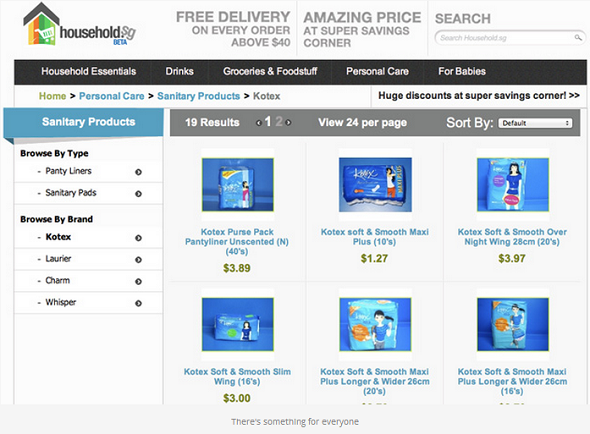Eight years on, Singapore entrepreneur seeks first e-commerce success
RIP
For 25 year-old Reuben Lee, entrepreneurship can sometimes be an agonizing expedition.
After being knocked down by his failure at online grocery store Household.sg, he could only watch as former competitor RedMart blazed a trail and became a frontrunner in the race to make online groceries profitable not just in Singapore but in Asia.
But he won’t have it any other way. If there ever was a tinge of bitterness or regret, it wasn’t visible when we met.
In fact, Reuben has bounced back with a third startup, and it’s called ShopAbout.sg, which aims to help retail stores by bringing them online. Within a few months, the company has quickly scaled to a team of 11 after raising a six-digit angel round. It is now seeking to hire even more employees.
He can’t imagine himself doing anything else. His first foray into e-commerce was Zakoola, an online bookstore that was started eight years ago — way ahead of its time.
“As a teen I had no life. While my friends clubbed, I did none of that nonsense. I spent my free time reading about people like Richard Branson and selling iPods that I imported from overseas,” said Reuben, ”I thought these entrepreneurs were cool. I want to be like them.”
Last year, he went on a random Silicon Valley trip that gave him a serendipitous encounter with Lawrence Koh, a Singaporean who was on a stopover to summer school in Harvard.
They started out bunking together at a common friend’s house, then went on a trip to Los Angeles. They discussed the idea of bringing brick-and-mortar stores online, and decided to plunge in last October.
At first glance, ShopAbout.sg looks like any traditional e-commerce store: think online shopping ‘malls’ like Amazon and regional counterparts Zalora and Lazada.
But that’s only on first glance. Traditional e-commerce is typically consumer-centric, meaning it derives most of its revenue by catering to the whim of shoppers. ShopAbout.sg, meanwhile, is all about giving brick-and-mortar stores a leg up in a time when they are placed “under siege” by online retailers. To do that, it is providing a comprehensive suite of services to merchants.
So, besides earning between 7.5 percent to 15 percent commission from transactions (similar to Amazon), ShopAbout also charges merchants a monthly subscription fee. In return, the company provides a SaaS platform for couriers and merchants to manage inventory and order fulfilment, as well as marketing, graphic design, and consultancy services.
“Platforms like Shopify are not always ideal for merchants. E-commerce, after all, is more than just the website,” said Reuben.
To date, the company has signed up 45 merchants, up from 15 when it launched on this year’s April Fool’s Day. It is targeting mainly SMEs, with brands like Bodynits, Cellini, and NewUrbanMale on board. Its biggest signing so far is lingerie brand Triumph.
Reuben has declined to reveal pricing or revenue, but suffice to say Shopabout already has paying customers.
The startup is also noteworthy in its hands-off approach towards inventory by eschewing the consignment model. It doesn’t rent a warehouse, instead acting as a go-between for couriers and merchants.
That’s a starkly different approach from another Singapore-based startup Anchanto, a pure B2B play that also wants to help offline retailers get online, except that it is doing so by providing a logistical and analytics backbone.
Compared to traditional retailers, ShopAbout occupies the middle ground between Amazon’s full-service model and Qoo10′s self-service platform.
The latter takes only 3 percent to 6 percent off every transaction, but pretty much leaves merchants on their own. Shopabout requires some proactivity on the merchant’s part in managing online operations, but it also provides more tools and services.
Reuben seems confident about the company’s B2B component. What he’s still trying to figure out is the online retail side.
With the number of strong competitors multiplying in recent years, ShopAbout needs to make its online storefront pop and bring in enough dollars to convince merchants to stay on.
It hopes to do so by focusing on quality products, merchant-shopper interaction, user experience, and highlighting the merchant’s story and brand. This would entail a different marketing mix since the company would in effect be reaching out to the merchant’s existing customer base.
Echoes of the past
The way ShopAbout has taken shape, especially in its shunning of warehousing, is a reflection of the painful lessons Reuben had experienced in his past two endeavors.
For logistics-intensive businesses to work, they must possess a strong team with the right expertise. Unlike RedMart, Household.sg didn’t have any of those.
While plenty of talk has focused on pushing out a minimal viable product as quickly as possible and iterating as you go, e-commerce businesses provides less leeway due to a higher upfront commitment.
Reuben, being a solo founder and a greenhorn, failed to plan adequately and couldn’t anticipate problems from the beginning. He underestimated the labor and capital intensive nature of the business, and did not manage to attract the right investors that would let him retain control of the business while giving him the financial cushion to build volume.
He found the concept of giving up a majority stake unpalatable.
So, faced with the prospect of running an unsustainable business, he decided to kill it off.
The serial entrepreneur’s past experiences has not only molded the company’s business model. It has shaped the way he’s running it.
ShopAbout hosts all-hands meetings on Mondays, and its office setup is collaborative in nature due to a lack of walls. Reuben is big on one-to-one feedback sessions where good practices and areas for improvement are discussed.
As a co-founder, managing and communicating with his employees has been a challenge.
“I sort of lack that part of my brain which properly handles human relationships,” he said, adding that in his quest to get things done, he needs to learn how to empathize with and take into account the concerns of stakeholders.
He also found that excessive communication is better than a lack of it. Employees tend to know less than he assumes simply because as a founder, it’s his job to stay on top of everything.
“It’s unnatural, but I need to learn the art of reiterating my vision constantly to employees.”
The post Eight years on, Singapore entrepreneur seeks first e-commerce success appeared first on SGE.

 Yahoo Finance
Yahoo Finance 


